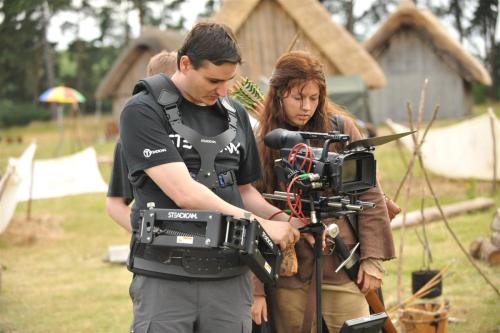ASK & DISCUSS
INDEXDo you think crowdfunding will replace other forms of film funding, or is it just for students and niche films?
12 years, 7 months ago - Vasco de Sousa
I've started crowdfunding a film, and two of my supporters have asked why I don't just use traditional finance methods. (Edit, thanks for all your views below. We've now had some success in raising our production budget. More about the film and campaign can be seen at http://darasays.com .)
I've looked over the past year at some of the films that do well on crowdfunding platforms, and it appears they do tend to lend themselves to niche projects. I don't know if my project is more "mainstream", but I wonder if British films ever are ever completely mainstream.
The current funding bodies for British cinema seem to the the Film Office (or whatever replaces it), TV stations (including Film Four), and Hollywood "runaway" productions. Add to that tax-break productions which some people want to close.
Could crowdfunding replace or boost any of these? Could they help small British filmmakers who don't have connections break in? Or, do you think crowdfunding is more for the offbeat films that have daring subject matter that others wouldn't touch?
Only members can post or respond to topics. LOGIN
Not a member of SP? JOIN or FIND OUT MORE
12 years, 7 months ago - Ben Blaine
I presume that's why crowdfunding is based around "perks" rather than a real investment in the project. You're effectively selling very complex DVD bonus packs, rather than offering shares or any other form of profit participation.
12 years, 7 months ago - Matt Choules
I recently gave to a crowdfunding campaign as they were looking for money to go into pre-production, rather than asking for the whole budget.
For now, I think this is a better idea, raising around £30k to get a decent producion team involved (who can then go get the next £3m to actually make the film) makes sense to me...
The only other film I gave to had already shot everything and just needed to get it through post. What they had done up to the campaign was truely impressive, so I felt it was my duty to help them along the last leg.
12 years, 7 months ago - Vasco de Sousa
What about distribution? Does crowdfunding have any affect in that area?
12 years, 6 months ago - James Heath
I think distribution is where crowd funding is getting really interesting and will develop a lot over the next couple of years. Check out why in my blog about the future of crowd funding here:
http://jamesjheath.com/producer-says/2013/2/27/the-future-of-film-crowd-funding-with-an-emphasis-on-the-crowd
12 years, 7 months ago - Javier Saavedra
I think that any crowd sourcing project based around film should always involve a video, otherwise no one will trust that you are able to able to make the project. I also think that it's better to have a realistic target and be surprised by passing or hitting it.
When I was raising for my film (www.indiegogo.com/doppelgangerfilm) we got more donations once we made a trailer for the film. Treating indiegogo like a shop front rather than the product definitely helps you in focusing on the film and promoting its strengths and original features.
12 years, 7 months ago - Vasco de Sousa
I think that they let you use the extra money for your project. From what I see, both Kickstarter and PleaseFund.us do, and I think Crowdfunder does as well.
I would ask them first, of course, policies change all the time. But, some guys actually change their pitch when they find out they exceeded their target, to say what else they would do (one project said if they reached a second goal, they'd make their film in 3D.) And, you'd need some of that extra money to deliver the extra rewards anyway.
In the unlikely event that we raise more than we asked, we'll find a way to use it to make the film even better. I don't know if people want to see a romantic comedy in 3D, but we'll ask our backers.
We won't keep it, as the whole point is to make a film. We'll use what we get for the film. (If we don't get our goal, we get nothing, but we can't give up after so many people have helped us promote the film.)
My suggestion, based on experience and observation, is to check other people's goals first. I think being the most expensive project on PleaseFund.us has hurt Dara Says somewhat. I've had to share my budget with people, and explain it, when I might not have had to go into as much detail if there were more expensive projects on the same platform.
I think we had the only feature length on PFu, which is another rarity in crowdfunded films (most seem to be shorts.) So, when you're a feature up against shorts, your film is going to cost more. But, if you can find one project more expensive than yours on it, I think PFu is a great platform, and they are extremely helpful and supportive.
12 years, 7 months ago - James Heath
I think ideas do need to be somewhat tailored to work for crowdfunding. Thats not to say niche films are the only ones that will succeed, though you should have something to sperate you from the crowd. I've written a blog about the 5 most common crowdfunding mistakes. Check it out here: http://jamesjheath.com/producer-says/2013/2/18/top-5-crowd-funding-mistakes
12 years, 7 months ago - Ben Blaine
Crowd funding is actually less likely to work for the truly niche film, after all in order to be successfully funded you need to draw a crowd.
The other thing to remember about crowd funding is that your backers are customers not investors. I'd have thought that what your backers are trying to tell you is not necessarily that your film is mainstream, just that they can see how it could make a return and that they would rather invest properly and share that return rather than give you a donation in return for a perk.
This is especially the case if you're hoping to get people to invest large sums. Raising a tiny budget of £20-£50k through £50 donations requires a massive amount of support... finding people willing to invest more substantial sums of money into a project is not necessarily as hard as you might imagine. However by the time someone is handing over thousands of pounds they'll more likely want to do so as an investor, with all the real financial perks and controls that this brings, rather than as a crowd-sourced backer...
So I think you're closest when you see it as a boost to existing finance strategies.
Good luck raising your budget mate.
all the best
Ben
12 years, 7 months ago - Kristina Hughes
Funny, I just shared this link in another thread. So many people looking to go the crowdfunding route, make basic mistakes. I hope you'll read this article and share it.
Crowdfunding -
How Not To Sound Like You're Begging
http://www.holdonlog.com/pages/AN-FUNDING.html
12 years, 7 months ago - Dan Selakovich
@Ben Blaine. That's correct, Ben. There has been a little movement on this issue under the new jobs bill to open up crowd sourcing under the investment banner. But most of the crowd sourcing sites don't want to jump into that kind of structure because of the legal hassles. I'm sure other crowd sourcing sites will pop up if the law passes, but I don't see that happening given the disfunction of the American Congress.As for the perks, I recently heard an interview with one of the crowd sourcing developers. Apparently the big mistake for those looking for funding was that they gave away too many perks, and were actually victims of their own success. I'd love to have that problem.
12 years, 7 months ago - Kate Madison
Hey Sue
Sorry that your crowdfunding campaign has not been successful but having just taken a look at your indiegogo page I can kind of see why. I also did a relatively unsuccessful campaign a couple of years ago and since then have been keeping a close eye on projects on both indiegogo and kickstarter to study what's successful and what's not. I’m no expert and I don’t think there’s any magic formula but here’s my two cents.
Crowdfunding is a huge thing at the moment which means that you have to compete with loads of other people all selling their idea or projects as ‘the’ thing to donate to. You have to excite the audience so that they really want to get involved, tell their friends and donate some money. You can’t rely on friends and family. Asking 100 facebook friends will not get you £50,000 unless absolutely all of them put in a heck of a lot of money and even if they do, why use a third party site that’s gonna take a chunk of that money, if they're friends just ask them direct. You have to work hard at your campaign, ideally not on your own. The more people involved in your project, the more contacts they have to tell etc.
Your crowdfunding page is your shop window, your advert, your showreel almost. People will judge your project from that page. You need a video. It’s essential. Especially when you’re a filmmaker. Check and double check for typos and punctuation issues. Tell us about your project. Why does it need to be made? Why should we care? If your page looks like it’s had no effort put in or is unprofessional then people will think your film will be the same.
People donate for various reasons. They’re friends. They want to support you as a filmmaker. They really like the project and want to see it made. They really want a perk that you’re offering. You need to give people enough info and incentive.
Sorry if that sounds really negative but hopefully it’s stuff to consider if you decide to try again.
Kate
12 years, 7 months ago - Dan Selakovich
I have no idea about British law, but here in the U.S. it is illegal (currently) to raise funds for a profit venture in this way. The SEC has very strict guidelines that one must follow to the letter for investment capital, including how many people can invest and how many people you can even approach to invest.
12 years, 7 months ago - David Graham Scott
Can anyone tell me the score if you get overfunded for your project? For example, if you asked for £2000 and eventually make £5000 do all the different crowdfunding sites allow you to keep the extra money?
I'm just about to try a crowdfunder re post-production funding for a new doc that I've 99% filmed. It's a follow-up to a doc I did quite well with and which generated a lot of global interest...also taps into a current topic of interest to many ie the 'war on drugs'.
Any experience/thoughts about the target cash goals?
Many regards
David x
12 years, 7 months ago - Sue Shearing
Having been advised by several sources to try crowdfunding, I decided to give it a go. I was embarrassed to ask for money, but followed all the advice and contacted about 100 people on my social networks.One sent me a rude reply, another said he was broke, one said he would give me £5 but didn't actually do it, and the rest ignored me.Even though I had sponsored several of them in the past. I now feel that I have alienated my contacts and friends, and that the whole thing was a waste of time.Except for two complete strangers who donated a total of £65 for which I am extremely grateful, and my dear son who made a contribution.
It has been an embarrassing and humiliating experience, so don't do it unless you're very thick skinned.My site is www.indiegogo.com/catchmefilms/X/2011820
in case you want to put a smile on my face today!
12 years, 7 months ago - Robert Stern
Very interesting discussion, this. I've been giving the future of crowdfunding quite a bit of thought recently a) because I used it to raise $40,000 for a documentary last year b) because I'm about to launch another campaign to raise £50,000 and c) because I'm about to give a talk on crowdfunding (now that I'm an 'expert' with one successful campaign under my belt).
I think it's still a very immature industry that will look very different very soon. As I see it, crowdfunding platforms in their current form do not have much of function. The site design, payment and analytical services they offer are just an assembly of existing plug-in modules (PayPal, Google Analytics etc) and technically trivial - indeed much cheaper DIY crowdfunding website plug-ins are already becoming available.
Though psychologically important, especially to crowdfunding newcomers, existing platforms' role as a trusted safe pair of hands is an illusion, as they actually guarantee neither content nor delivery. This means the only real added-value function they can claim to earn their 5% fee is as a shop window, driving funding traffic you would not otherwise reach yourself. My experience using Indiegogo at least (search for 'The Ukes Down Under' for details) suggests this is negligible. I'm trying Kickstarter this time, who can claim to be a bit more discriminating and whose site appears to suggest 'their' funders (actually an accumulation of 'our' funders) can contribute as much as 25% of the total funding. I doubt this very much, but am willing to try it once (watch out for 'Ben Law's Woodland Year' launching on Monday Feb 18th).
I think a trusted 3rd-party brand is indeed very important to reassuring funders of your project's credibility, but there are many many more trusted and better-known brands than some distant Silicon Valley upstart start-up. Since WWF's involvement with 'The End of The Line', hooking up with a charity appears to have become accepted as a way to make an campaigning documentary while maintaining editorial credibility. Green Lions have just displaced my own effort last year as the UK's #4 most-crowdfunded doc with their Project Wild Thing supported by the National Trust. Moreover, the endorsement of a charity like WWF is far more meaningful to potential funders than that of someone they've never hear of, like Kickstarter or Indiegogo.
The downside is that charities have many different and sometimes compromising objectives from those of a filmmaker, which can end up being just as complicated as dealing with a broadcaster.
My new project experiments with a variation on this - instead of close collaboration with a single charity, I've sought the endorsement of a variety of related charities, publications and professional organizations, simply on the basis that their logo and a short message of support is added to the campaign page. My project benefits from their accumulated credibility, they benefit from exposure to potential new members/subscribers. I've got 10 such endorsements now, which should be pretty reassuring to anyone wondering if this project is really pukka, but wWe'll soon find out if it works or not, as the campaign launches next week...crowdfunding's other great merit being you get to set your own agenda and deadline, rather than being at the mercy and whim of prevaricating, risk-averse commissioning editors/film funds/sponsors etc.
If anyone in the Salisbury area is interested in hearing me yak at further length on the subject, and has nothing better to do at 7.30 on Tue Feb 19th, you're welcome to come along to my talk at the Salisbury Arts Centre. It's free.
12 years, 7 months ago - Vasco de Sousa
Thanks all, you've answered some questions I didn't think of asking.
Ben Blaine isn't alone in his view about it not being niche. One of my backers responded to a similar question in an academic group this morning, saying essentially the same thing (he actually compared it to a political campaign, but without the primaries.)
I've also found that you need a crowd in pre-production. I'll try not to get too cynical about it right now, but the press is responding to Bjork's campaign by saying crowdfunding has been taken over by rich people in search of publicity stunts. (So, there goes my niche theory?)
We've spoken to journalists about our own campaign, but with the lack of any big names, they aren't in a rush to print anything (though some have requested and received photographs.)
We have a team of two, essentially, although we have a lot of talented people watching in the wings and telling others about our project. Perhaps we should have really pushed to get them more involved at an earlier stage, and maybe there's still time for some last minute extra video. (and that goes for other ongoing campaigns too.)
Anyway, you've all given me some things to think about, and I'll probably add to my chronicle and campaign as a result. (I wrote more to say about every point brought up, but I tend to go on too much sometimes.) Thank you.
http://darasays.com










